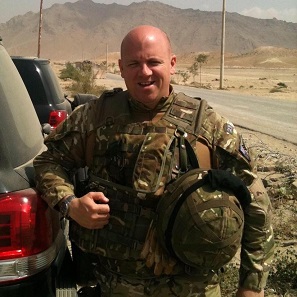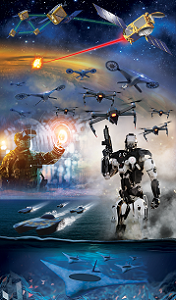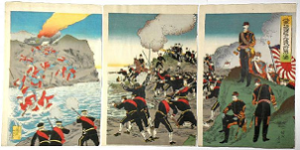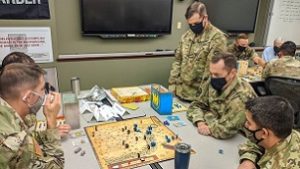[Editor’s Note: Army Mad Scientist is pleased to present our latest episode of The Convergence podcast, featuring our interview with Warrant Officer Class 2 Paul Barnes, British Army, discussing his recent article in Modern War Institute (MWI), learning from historical conflicts, and fighting against “neophilia” and “presentism” — Enjoy!]
[If the podcast dashboard is not rendering correctly for you, please click here to listen to the podcast.]
 Paul Barnes is a serving Warrant Officer in the British Army, employed as a Doctrine Writer
Paul Barnes is a serving Warrant Officer in the British Army, employed as a Doctrine Writer at the Land Warfare Centre. He is uniquely a Chief of the Air Staff’s Fellow, a Chief of the General Staff’s Fellow, and a former MWI Fellow at West Point in 2021.
at the Land Warfare Centre. He is uniquely a Chief of the Air Staff’s Fellow, a Chief of the General Staff’s Fellow, and a former MWI Fellow at West Point in 2021.
 In today’s interview, Warrant Officer Class 2 Paul Barnes, British Army, discusses his article Learning the Wrong Lessons: Biases, the Rejection of History, and Single-Issue Zealotry in Modern Military Thought, featured by our colleagues at Modern War Institute; learning from historical conflicts; and fighting against “neophilia” and “presentism“. The following bullet points highlight key insights from our interview:
In today’s interview, Warrant Officer Class 2 Paul Barnes, British Army, discusses his article Learning the Wrong Lessons: Biases, the Rejection of History, and Single-Issue Zealotry in Modern Military Thought, featured by our colleagues at Modern War Institute; learning from historical conflicts; and fighting against “neophilia” and “presentism“. The following bullet points highlight key insights from our interview:
-
-
 In the aforementioned article, Paul Barnes discusses the dangers of “presentism,” in which current events are catastrophized and used to inform the future without adequate acknowledgement of historical context. This mindset creates two dangerous fallacies: 1) that the world is more dangerous than it has been before; and 2) that technology is developing more rapidly than ever before. These statements are both false and promote the idea that history cannot help us understand our operational environment.
In the aforementioned article, Paul Barnes discusses the dangers of “presentism,” in which current events are catastrophized and used to inform the future without adequate acknowledgement of historical context. This mindset creates two dangerous fallacies: 1) that the world is more dangerous than it has been before; and 2) that technology is developing more rapidly than ever before. These statements are both false and promote the idea that history cannot help us understand our operational environment.
-
-
-
- The misconceptions promoted by presentism are generally accepted due to a lack of contextual historical understanding. However, militaries also promote the ideas of presentism to secure greater budget allocations. Analysts, too, use presentism to promote the legitimacy of their ideas and engagement with their work.
-
-
-
-

This Japanese wood block triptych illustrates one of Japan’s victories over Russian Forces in 1904. The bias of presentism led some to erroneously conclude that “disciplined and determined infantry would always carry the day — even against entrenched positions,” with catastrophic consequences during The Great War a decade later. / Image entitled: Battle at the Yalu River (The Capture of an Imperial Russian Stronghold) Leveraging historical context to avoid the bias of presentism can be challenging. Even information from on-the-ground analysts throughout history will include bias. Multiple perspectives from history should be recognized, thus creating the opportunity to ‘learn from committee’ and avoid the pitfalls of biased reporting.
-
-
-
-
- The age of the tank is not over, as seen in the ongoing crisis in Ukraine. Modern and future warfare will continue to leverage a combination of information operations and heavy combined arms maneuver.
-
-
-
-

School for Advanced Military Studies (SAMS) students play “Napoleon: 1806” as part of their study of the Napoleonic Wars, refighting the Jena-Auerstadt Campaign to learn the challenges and friction associated with moving large masses of troops. / Source: Army University Facebook page, photo by Dr. James Sterrett To avoid presentism, enhanced education on critical thinking, bias recognition, and military history should be incorporated in professional military education for both Soldiers and Leaders. The latter is especially important, as an understanding of the past helps provide context for comprehending the present. While we can “train for the known,” education will help the Army be better prepared for the unknown.
-
-
 Stay tuned to the Mad Scientist Laboratory for our next episode of The Convergence podcast — Innovation at the Edge — featuring senior military leaders, field and company grade officers, and young Soldiers discussing innovation at the unit and individual level, thinking differently about modern warfare, and implementing grassroots transformation in the U.S. Army.
Stay tuned to the Mad Scientist Laboratory for our next episode of The Convergence podcast — Innovation at the Edge — featuring senior military leaders, field and company grade officers, and young Soldiers discussing innovation at the unit and individual level, thinking differently about modern warfare, and implementing grassroots transformation in the U.S. Army.
If you enjoyed this post and podcast, check out the following content:
The Operational Environment (2021-2030): Great Power Competition, Crisis, and Conflict, the entire document from which that post was excerpted, and the TRADOC G-2’s Threats to 2030 video addressing the challenges facing the U.S. Army in the near operational environment (i.e., now to 2030)
Other People’s Wars: The US Military and the Challenge of Learning from Foreign Conflicts, with Brent L. Sterling, and associated podcast
Ultimate Victory: Lessons on Future Warfare from Field-Marshal Viscount William Slim, by Luke Shabro
Making the Future More Personal: The Oft-Forgotten Human Driver in Future’s Analysis and “Once More unto The Breach Dear Friends”: From English Longbows to Azerbaijani Drones, Army Modernization STILL Means More than Materiel, by Ian Sullivan
Top Attack: Lessons Learned from the Second Nagorno-Karabakh War and associated podcast
Insights from the Nagorno-Karabakh Conflict in 2020 (Parts 1 and 2)
The Convergence: The Future of Ground Warfare with COL Scott Shaw and associated podcast
Lessons from the Cold War: “The Ugly American” and Multi-Domain Operations by Peter Brownfeld
Why the Next “Cuban Missile Crisis” Might Not End Well: Cyberwar and Nuclear Crisis Management by Dr. Stephen J. Cimbala
How Big of a Deal are Drone Swarms? by proclaimed Mad Scientist Zak Kallenborn
The Dawn of the Loitering Munitions Era, by proclaimed Mad Scientist SGM Daniel S. Nasereddine
Disclaimer: The views expressed in this blog post do not necessarily reflect those of the U.S. Department of Defense, Department of the Army, Army Futures Command (AFC), or Training and Doctrine Command (TRADOC); nor the UK Ministry of Defence, British Army, or Land Warfare Centre.



